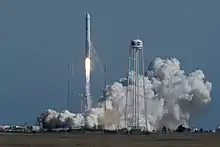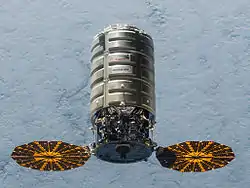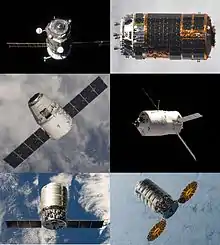Cygnus NG-11
NG-11, previously known as OA-11, is the twelfth flight of the Northrop Grumman robotic resupply spacecraft Cygnus and its eleventh flight to the International Space Station under the Commercial Resupply Services (CRS-1) contract with NASA.[5][6] The mission launched on 17 April 2019 at 20:46:07 UTC.[1] This is the last mission from the extended CRS-1 (phase 1) contract; follow-up missions are part of the CRS-2 contract.[7] Cygnus NG-11 was also the first mission to load critical hardware onto Cygnus within the last 24 hours prior to launch, a new Antares feature.[8]
.jpg.webp) Canadarm2 grapples the S.S. Roger Chaffee, while Dragon C108 is docked to Harmony. | |
| Names | OA-11 (2016–2018) |
|---|---|
| Mission type | ISS logistics |
| Operator | Northrop Grumman |
| COSPAR ID | 2019-022A |
| SATCAT no. | 44188 |
| Mission duration | 232 days, 18 hours, 42 minutes |
| Spacecraft properties | |
| Spacecraft | S.S. Roger Chaffee |
| Spacecraft type | Enhanced Cygnus |
| Manufacturer |
|
| Start of mission | |
| Launch date | 17 April 2019, 20:46:07 UTC[1] |
| Rocket | Antares 230 |
| Launch site | Wallops Pad 0A |
| Contractor | Northrop Grumman |
| End of mission | |
| Disposal | Deorbited |
| Decay date | 6 December 2019, 15:28 UTC |
| Orbital parameters | |
| Reference system | Geocentric orbit |
| Regime | Low Earth orbit |
| Inclination | 51.66° |
| Berthing at the International Space Station | |
| Berthing port | Unity nadir |
| RMS capture | 19 April 2019, 09:28 UTC[1] |
| Berthing date | 19 April 2019, 11:31 UTC |
| Unberthing date | 6 August 2019, 13:30 UTC[2] |
| RMS release | 6 August 2019, 16:15 UTC[3] |
| Time berthed | 109 days, 1 hour, 59 minutes |
| Cargo | |
| Mass | 3,436 kg (7,575 lb)[4] |
| Pressurised | 3,162 kg (6,971 lb) |
| Unpressurised | 239 kg (527 lb) |
 NASA insignia | |
Orbital ATK and NASA jointly developed a new space transportation system to provide commercial cargo resupply services to the International Space Station (ISS). Under the Commercial Orbital Transportation System (COTS) program, then Orbital Sciences designed and built Antares, a medium-class launch vehicle; Cygnus, an advanced maneuvering spacecraft, and a Pressurized Cargo Module which is provided by Orbital's industrial partner Thales Alenia Space.[9] Northrop Grumman purchased Orbital in June 2018; its ATK division was renamed Northrop Grumman Innovation Systems.[10]
Concurrently, Nepalese satellite NepaliSat-1 and Sri Lankan satellite Raavana 1 were launched as part of Cygnus NG-11 as deployable payloads.[11]

History
Cygnus NG-11 is part of an extension program that enables NASA to cover the ISS resupply needs until the Commercial Resupply Services 2 contract enters in effect.[12] The mission launched on 17 April 2019, at 20:46:07 UTC from Wallops Island, Virginia.
Spacecraft
Production and integration of Cygnus spacecraft is performed in Dulles, Virginia. The Cygnus service module is mated with the pressurized cargo module at the launch site, and mission operations are conducted from control centers in Dulles, Virginia and Houston, Texas.[9] This will be the eighth flight of the Enhanced-sized Cygnus PCM.[13]
The spacecraft for the NG-11 is named the S.S. Roger Chaffee after Roger Chaffee who lost his life during training for the Apollo 1 mission.[14] On 17 April 2019 at 20:46:07 UTC, Antares launched the NG-11 mission to the International Space Station from Wallops Island, Virginia.[1][15]
Manifest
Total weight of cargo: 3,436 kg (7,575 lb), consisting of 3,162 kg (6,971 lb) in pressurized cargo and 229 kg (505 lb) in unpressurized cargo.[4]
- Crew supplies: 987 kg (2,176 lb)
- Science investigations: 1,569 kg (3,459 lb)
- Spacewalk equipment: 24 kg (53 lb)
- Vehicle hardware: 628 kg (1,385 lb)
- Computer resources: 4.5 kg (9.9 lb)
- Northrop Grumman-related equipment: 35 kg (77 lb)
Smallsats deployed during NG-11:
- AeroCube 10A (JimSat) and 10B (DougSat) by The Aerospace Corporation[16]
- Aeternitas, Ceres, and Libertas, three CubeSats in the Virginia CubeSat Constellation, launched as part of NASA's ELaNa-26 mission, developed by Old Dominion University, Virginia Tech, and the University of Virginia, respectively.[17][18]
- EntrySat[17]
- IOD-1 GEMS (In-Orbit Demonstration - Global Environmental Monitoring Satellite)[17]
- KRAKsat, a CubeSat created by Polish students from AGH University of Science and Technology and Jagiellonian University[17][19]
- SASSI2 (Student Aerothermal Spectrometer Satellite of Illinois and Indiana)[20]
- Seeker, a free-flying NASA CubeSat for vehicle inspection[17]
- SpooQy 1[17]
- Światowid, a CubeSat by SatRevolution[17]
- 60 × ThinSats in 12 strings, experimental miniature satellites built by school children and university students[20][21]
- Uguisu, Raavana 1, and NepaliSat-1, 1U CubeSats developed by students in Japan, Sri Lanka, and Nepal, respectively, as part of the BIRDS-3 project[17]
New hardware, known as the Thermal Amine Scrubber, the first Exploration ECLSS Tech Demonstration aboard ISS, which will be activated in April 2019 and scrub additional CO2 from the ISS atmosphere.
References
- Richardson, Derek (19 April 2019). "NG-11 Cygnus Begins 3-month ISS Stay". Spaceflight Insider. Retrieved 4 November 2019.
- Todd, David (12 August 2019). "Cygnus NG-11 departs ISS dropping off satellites as it goes". Seradata. Retrieved 4 November 2019.
- Clark, Stephen (6 August 2019). "Cygnus supply ship departs space station, begins extended mission". Spaceflight Now. Retrieved 4 November 2019.
- "Northrop Grumman CRS-11 Mission Overview" (PDF). NASA. Archived from the original (PDF) on 21 April 2019. Retrieved 15 June 2019.
 This article incorporates text from this source, which is in the public domain.
This article incorporates text from this source, which is in the public domain. - "Launch Schedule". Spaceflight Now. Retrieved 12 February 2015.
- "International Space Station Flight Schedule". Students for the Exploration and Development of Space. 15 May 2013.
- Gebhardt, Chris (1 June 2018). "Orbital ATK looks ahead to CRS2 Cygnus flights, Antares on the commercial market". NASASpaceFlight.com. Retrieved 2 June 2018.
- Foust, Jeff (16 April 2019). "Latest Cygnus mission to ISS includes new features". SpaceNews. Retrieved 23 September 2019.
- "Cygnus Fact Sheet" (PDF). Orbital ATK. 24 March 2015. Archived from the original (PDF) on 26 September 2015. Retrieved 14 August 2015.
- Erwin, Sandra (5 June 2018). "Acquisition of Orbital ATK approved, company renamed Northrop Grumman Innovation Systems". SpaceNews. Retrieved 23 July 2018.
- Paudel, Nayak (18 April 2019). "Nepal's first ever satellite launched into space". The Kathmandu Post. Retrieved 18 April 2019.
- Leone, Dan (20 August 2015). "NASA Considering More Cargo Orders from Orbital ATK, SpaceX". SpaceNews. Retrieved 17 April 2019.
- Leone, Dan (17 August 2015). "NASA Orders Two More ISS Cargo Missions From Orbital ATK". SpaceNews. Retrieved 17 August 2015.
- "S.S. Roger Chaffee" (PDF). Northrop Grumman. Archived from the original (PDF) on 17 April 2019. Retrieved 17 April 2019.
- Martz, Michael (17 April 2019). "Rocket launches from Wallops Island with student-inspired satellites from Richmond-area schools". Richmond Times-Dispatch. Retrieved 19 April 2019.
- Krebs, Gunter. "AeroCube 10A and 10B". Gunter's Space Page.
- Clark, Stephen (19 April 2019). "Cygnus supply ship delivers 3.8-ton cargo load to International Space Station". Spaceflight Now. Retrieved 5 November 2019.
- "Upcoming ElaNa CubeSat Launches". NASA. 3 July 2016. Archived from the original on 13 March 2019. Retrieved 12 March 2019.
 This article incorporates text from this source, which is in the public domain.
This article incorporates text from this source, which is in the public domain. - "KRAKsat". Retrieved 5 November 2019.
- Clark, Stephen (18 April 2019). "Antares rocket boosts Cygnus supply ship toward International Space Station". Spaceflight Now. Retrieved 5 November 2019.
- Krebs, Gunter. "ThinSat 1A, ..., 1L". Gunter's Space Page.

